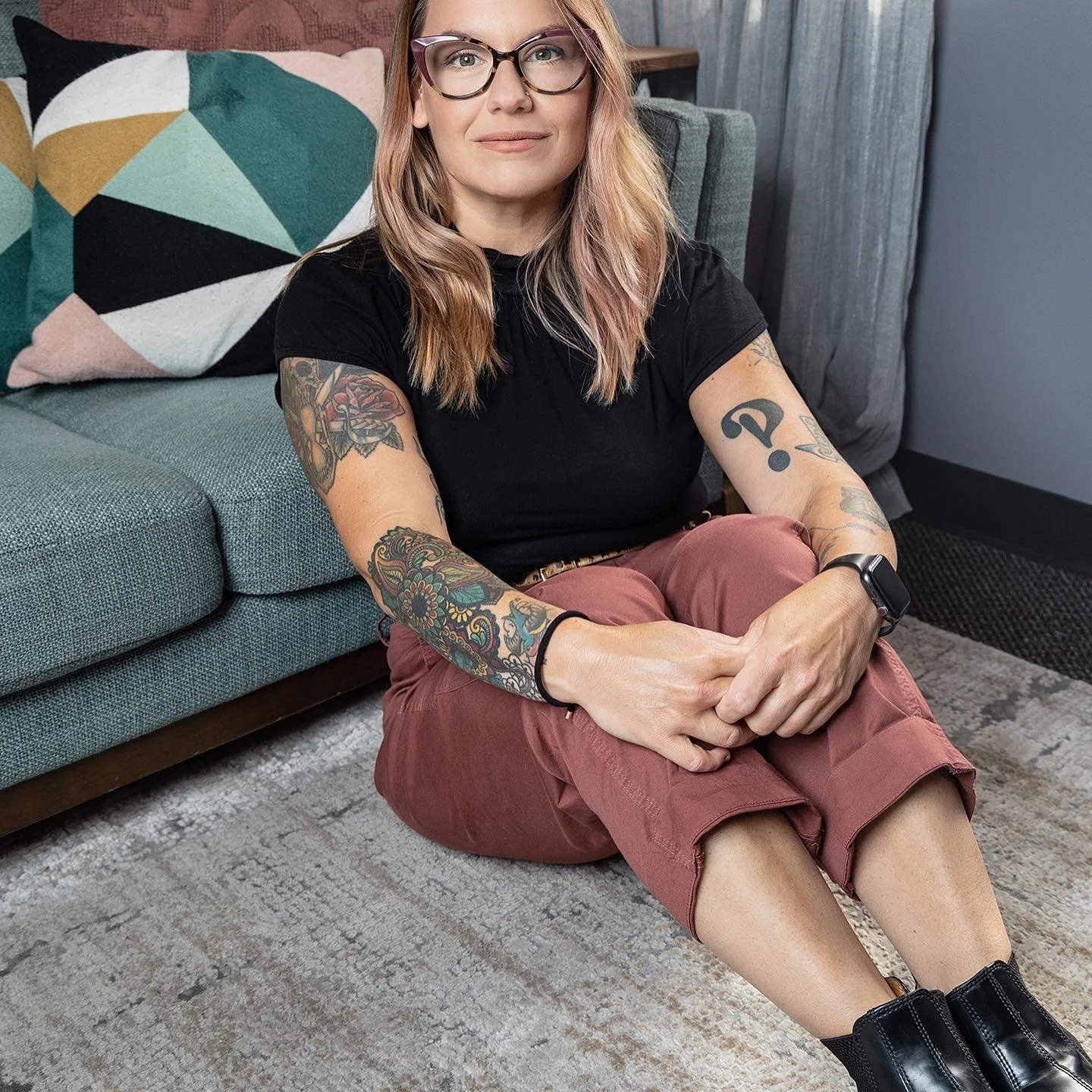
What’s it like working with a neurodivergent clinician
Online & In-person in TEXAS
Neurodivergent Clinicians See What Others Miss
Because neurodivergent brains don’t just think differently — we feel, process, relate, and make meaning differently. And working with someone who gets that in a lived, embodied, non-theoretical way changes everything.
Most of us spent our lives being misunderstood by well-meaning professionals who tried to “help” us become more consistent, more regulated, more realistic, more organized, more… well, neurotypical.
A neurodivergent clinician doesn’t treat your brain like a problem to be managed, but a pattern to be understood — a system with its own logic, beauty, intensity, and needs. We know the terrain from the inside, not just from training manuals. And that matters when you’re trying to unmask, unlearn, and rebuild your life from the ground up.
1. We clock nonlinear thinking.
Your brain doesn’t move in straight lines — it leaps, spirals, connects dots across galaxies. A neurodivergent clinician isn’t thrown off by the speed or the jumps. We follow it. We welcome it. We know how to work with it.
2. We recognize masking instantly — even the subtle, elegant versions.
You don’t have to waste energy performing competence here. I can spot the justification, the minimizing, the fawning, the high-functioning mask. I know the flicker of fawning, the high-functioning mask, the instinct to shrink or overexplain.
3. We don’t confuse intensity with pathology.
Your rapid-fire thinking, emotional depth, sensory intensity, and rich inner world don’t register as chaos here. We understand the difference between overwhelm and a nervous system tuned to a higher, fiercely alive frequency.
4. We understand burnout from lived experience.
Not theoretical burnout. Not corporate burnout. Neurodivergent burnout — the cellular-level exhaustion that happens from chronic masking, forced adaptation, and invisible labor. We recognize it before you do. And we treat it differently.
5. We know how to build structures that support, not suffocate, your brain.
Most “productivity hacks” fail neurodivergent people because they’re built on fantasies: endless bandwidth, predictable energy, zero sensory load. We create systems rooted in your reality — responsive, humane, flexible enough to hold fluctuation, and strong enough to help you function without self-betrayal.
6. We speak the language of “too muchness.”
You don’t have to slow your brain down, package your emotions neatly, or make your intensity digestible. You don’t have to justify your sensitivity or translate your inner world into something “reasonable.” I understand this wiring because I live in it, too.
7. We see your strengths as strengths — not quirks to be managed.
Your creativity, intuition, hyperfocus, sensitivity, and pattern-recognition aren’t quirks — they’re high-voltage capacities. They just can’t thrive in environments built for smaller, flatter, quieter versions of you. Our work helps you build a life where those capacities have room to operate at full power.
8. We honor your complexity instead of reducing you to symptoms.
Our work isn’t about repairing you; it’s about revealing you — the you beneath the masking, the overfunctioning, and the survival strategies. We create conditions where your actual self can come forward without pressure, performance, or shame.
Working with me
I’m not the clinician who tells you to be less. I’m here to help you reclaim the parts you’ve been told to mute — without burning out or fracturing yourself in the process.
You deserve a place where your brain is intelligible, your depth is welcome, and you don’t have to manage your presentation to be understood.
A space where you don’t have to perform to be seen.
What do you do?
As a neuroaffirming therapist, I work with adults who navigate emotional dysregulation by turning to things like alcohol, food, work, or constant productivity to manage anxiety or discomfort. Many of my clients feel stuck in cycles of overwhelm, shut down during conflict, or struggle to express their needs in relationships. Together, we explore the patterns that once helped you cope but now feel limiting, so you can build self-trust, communicate more clearly, and move through life with more steadiness and self-understanding.
What we’ll work on
Therapy can help:
foster self-understanding and acceptance
develop tools to advocate for yourself
learn to navigate social situations and build meaningful connections
develop mechanisms to manage distress and build resilience
craft a life built around your strengths, not your struggles
You are remarkable.
I’M HERE TO HELP you discover that.
FAQS
Common questions about therapy for neurodivergence:
-
No, therapy for neurodivergence encompasses much more than planning and calendars. While organization and time management skills are often addressed, therapy also focuses on emotional regulation, social skills, self-awareness, and coping strategies tailored to individual needs.
-
Whether to view neurodivergence as a disability is a personal choice. Many embrace their neurodiversity as a unique aspect of themselves, while others may identify with disability advocacy and support. It's important to recognize that neurodivergence can present challenges but also strengths and perspectives that enrich individuals and communities. Ultimately, the label of "disability" depends on individual experiences, needs, and self-identification.
-
Working with a therapist who is also neurodivergent can provide a unique understanding and empathy. They may share similar experiences, perspectives, and coping strategies, fostering a deeper connection and rapport. This shared understanding can lead to more effective communication, tailored interventions, and a sense of validation and acceptance in therapy sessions.

